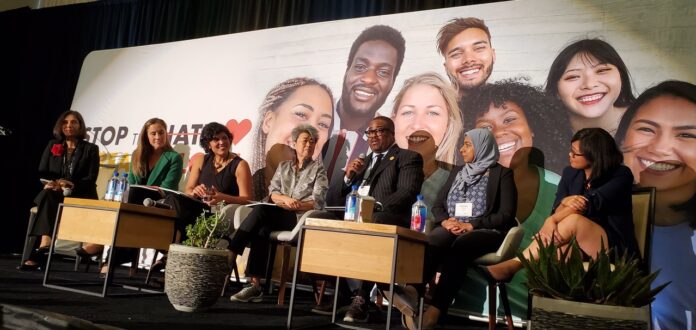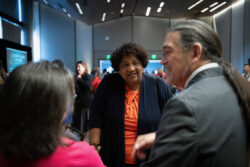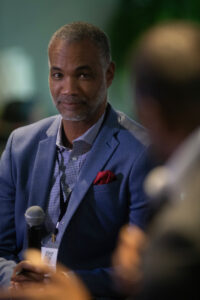
By Antonio Ray Harvey, California BlackMedia
The Ethnic Media Conference Awards and Expo took place at the Kimpton-Sawyer Hotel in downtown Sacramento on Aug. 31. The event celebrated the work of journalists, podcasters, photojournalists, and investigative reporters whose contributions have been published by media outlets serving ethnic audiences across California.
The awards ceremony, sponsored by Ethnic Media Services and California Black Media, recognized winners selected from over 300 entries republished between January 1 and December 31, 2022.
“We had more awards, we had more submissions than ever, and we had judges saying this was the best we’ve ever seen. “Now, that is against the odds of remarkable,” said Sandy Close, Ethnic Media Services (EMS) Executive Director.
In all, 26 writers, communications specialists, educators, playwrights, and publishers from across the state served as the judges. The award categories were: Breaking news, commentaries, explanatory analyses, feature reports, and photography.

The Ethnic Media Conference Awards and Expo was a full day event attended by over 300 journalists, publishers, elected officials, business leaders, and others.
Secretary of State Shirley N. Weber and U.S. Census Director Robert L. Santos opened the conference with messages that underscored the importance and power of ethnic media in California.
“California is the most diverse state in this nation, and it’s reflected in this room,” said Weber. “It’s reflected in our relationships with each other, and it’s reflected in our values. We will always celebrate that.”
California Legislative Black Caucus (CLBC) Chair Assemblymember Lori D. Wilson (D-Suisun City) and CLBC’s vice chair, Sen. Steven Bradford (D-Inglewood) made appearances at the event. State Controller Malia Cohen was the guest speaker at the awards ceremony and Secretary of Transportation Toks Omishakin participated in a plenary session.
Three plenary sessions were held. The breakout meetings were designed to discuss pressing statewide issues and how to develop public awareness campaigns that resonate with and engage all communities.
Rick L. Callender, the President of the California/Hawaii NAACP State Conference, spoke on behalf of Community-Based Organizations (CBOs) about how ethnic media covers issues that the mainstream media often overlook.
“If we cannot rely on the ethnic media and the Black press to do exactly what they are doing, to continue to report on what’s going on out there, or if we cannot partner with the ethnic media in the ways that we have; we won’t have anyone telling our stories. We need a strong, funded ethnic media,” Callender said.
“I know when I was listening to the folks from the state, we talked about the $90 million that was put into the community. Well, that’s excellent but I need to make sure that these dollars are getting to our ethnic media,” Callender added.

The final session before the presentation of awards was a Reporters Roundtable. A diverse group of journalists discussed the challenges of breaking the silence around community taboos and other sensitive issues that sometimes are left uncovered.
Ethnic media outlets are designed to cater to audiences defined by characteristics such as race, ethnic origin, religious affiliation, or gender identity.
Pan-ethnic media outlets target multiple ethnic audiences (such as pan-Asian Americans and Pacific Islanders, pan African diaspora, pan-immigrant, pan people-of-color, pan LGBTQ+).
Integrated into the Ethnic Media Conference Awards and Expo was the Stop the Hate Campaign (STH). This campaign facilitates cooperation between leaders of community-based organizations and ethnic media to address inter-ethnic tensions and help communities heal from hate.
Authorized by the California Department of Social Services (CDSS), the STH program provides funding to qualified nonprofit organizations. These organizations offer support and services to victims and survivors of hate incidents and hate crimes, as well as their families. The program also promotes crime prevention measures.

Larry Lee, publisher Sacramento Observer moderated a panel discussion with Secretary Amy Tong, Government Operations and Transportation Secretary Toks Omishakin. ( Photos by Robert Maryland CBM)
The sponsors of the Ethnic Media Conference Awards and Expo were: Pacific Gas and Electric; BMO; SoCalGas; the California Wellness Foundation; the California Newspapers Publishers Association; Stop the Hate, Spread the Love; and Blue Shield California Foundation.
“Every time we come together like this, representing Black-owned and other Ethnic-owned media in California, we display the power we have to effect change in our communities and in our state government,” said Regina Wilson, Executive Director, California Black Media.
“The work we do in our communities is based on trust we have earned, commitment we have shown and relationships we have built over decades,” Wilson said. “Organizations can’t just show up, slap an ‘ethnic’ name on a media company and claim that they are serving our state’s diverse communities.”


